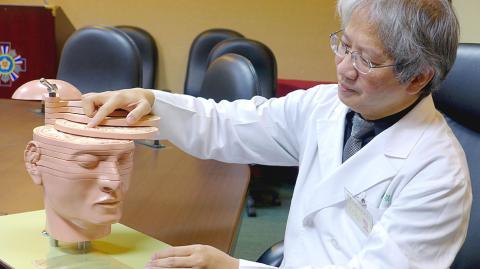A research team led by psychiatrists and scientists at Taipei Veterans General Hospital and National Yang-Ming University’s Institute of Brain Science has found that people with gender identity disorder (GID) are characterized by structural and functional alterations in the brain.
People with GID are conflicted between their biological sex and their gender identity.
The research team found, by means of functional connectivity magnetic resonance imaging (fcMRI), that the neural connectivity between the part of the brain associated with GID and that with social brain network shown by transsexuals differs — by being more active — from how it is displayed in their non-transsexual counterparts.

Photo: Hung Su-ching, Taipei Times
GID in the brain is believed to contribute to the control of sexual behavior, and the social brain network is the neural structure that is responsible for social interactions such as interpersonal relations, conflict monitoring and punishment adjustment.
The study also found that “transsexuals identify, when viewing male-female couples in erotic or non-erotic [“neutral”] interactions, with the couple member of the desired gender in both situations,” while the non-transsexual controls only did so in the erotic situations.
“The increased connectivity between the area in the brain that is associated with biological sex, sexual characteristics and behavior, and the area associated with social functions such as emotional conflicts, has formed a neural network of ‘system memory’ that is absent in non-transsexuals,” said Hsieh Jen-chuen (謝仁俊), one of the authors of the report and a professor at the institute. “And the presence of the network reflects the conflicts they have experienced both psychologically and physically.”
The psychosocial maladaptation evidenced by the difference of neural connectivity patterns in transsexuals “suggests a brain signature of the psychosocial distress for the gender-sex incongruity of [transsexuals],” the researchers said.
Psychiatrist Lee Ying-chiao (李鶯喬), one of the authors, said that among the 517 GID patients she has seen in the past 18 years, half exhibited symptoms of depression.

A magnitude 4.9 earthquake struck off Tainan at 11:47am today, the Central Weather Administration (CWA) said. The hypocenter was 32.3km northeast of Tainan City Hall at a depth of 7.3km, CWA data showed. The intensity of the quake, which gauges the actual effect of a seismic event, measured 4 in Tainan and Chiayi County on Taiwan's seven-tier intensity scale, the data showed. The quake had an intensity of 3 in Chiayi City and County, and Yunlin County, while it was measured as 2 in Kaohsiung, Nantou County, Changhua County, Taitung County and offshore Penghu County, the data showed. There were no immediate reports of

‘DENIAL DEFENSE’: The US would increase its military presence with uncrewed ships, and submarines, while boosting defense in the Indo-Pacific, a Pete Hegseth memo said The US is reorienting its military strategy to focus primarily on deterring a potential Chinese invasion of Taiwan, a memo signed by US Secretary of Defense Pete Hegseth showed. The memo also called on Taiwan to increase its defense spending. The document, known as the “Interim National Defense Strategic Guidance,” was distributed this month and detailed the national defense plans of US President Donald Trump’s administration, an article in the Washington Post said on Saturday. It outlines how the US can prepare for a potential war with China and defend itself from threats in the “near abroad,” including Greenland and the Panama

The Chinese Nationalist Party (KMT) is maintaining close ties with Beijing, the Democratic Progressive Party (DPP) said yesterday, hours after a new round of Chinese military drills in the Taiwan Strait began. Political parties in a democracy have a responsibility to be loyal to the nation and defend its sovereignty, DPP spokesman Justin Wu (吳崢) told a news conference in Taipei. His comments came hours after Beijing announced via Chinese state media that the Chinese People’s Liberation Army’s Eastern Theater Command was holding large-scale drills simulating a multi-pronged attack on Taiwan. Contrary to the KMT’s claims that it is staunchly anti-communist, KMT Deputy

RESPONSE: The government would investigate incidents of Taiwanese entertainers in China promoting CCP propaganda online in contravention of the law, the source said Taiwanese entertainers living in China who are found to have contravened cross-strait regulations or collaborated with the Chinese Communist Party (CCP) could be subject to fines, a source said on Sunday. Several Taiwanese entertainers have posted on the social media platform Sina Weibo saying that Taiwan “must be returned” to China, and sharing news articles from Chinese state media. In response, the Mainland Affairs Council (MAC) has asked the Ministry of Culture to investigate whether the entertainers had contravened any laws, and asked for them to be questioned upon their return to Taiwan, an official familiar with the matter said. To curb repeated